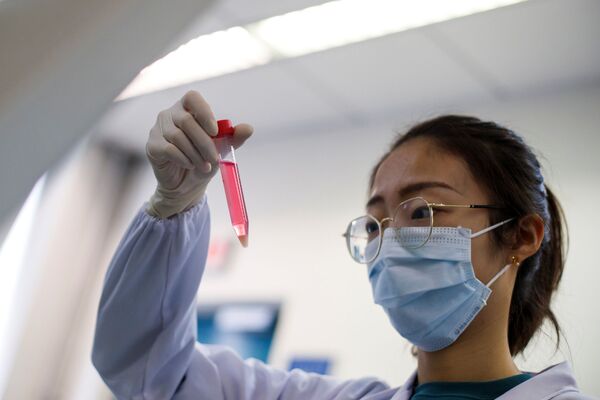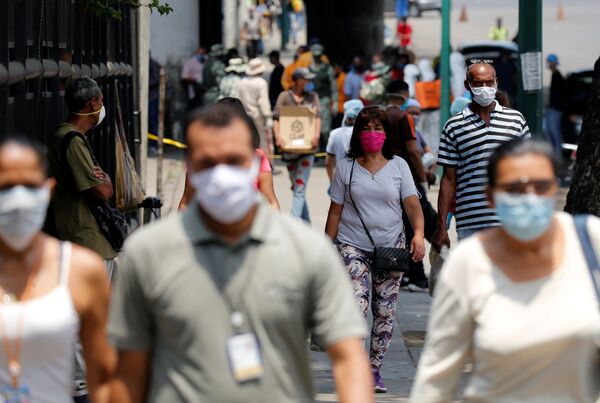The Trump administration is continuing to promote the idea that the novel coronavirus originated from the Chinese virology laboratory in Wuhan - despite a lack of evidence - and urging the People's Republic to grant access to the Wuhan Institute of Virology (WIV) to the US and "the world".
Earlier, the US called for conducting an investigation into how China and the World Health Organisation (WHO) handled the coronavirus pandemic. The idea was echoed by Australia government officials who underscored the necessity to run an international probe into China's COVID response "independently" of the WHO. The general idea of an inquiry into the origins of the virus was also backed by the British Ambassador Karen Pierce on 29 April and by President of the European Commission Ursula von der Leyen during her interview with CNBC on 1 May. For its part, China rejected the initiative as "politically motivated" and untimely.
The initiative backed by the US, Australia and the EU has no legal basis to stand on, underscores retired UN Independent Expert on the Promotion of a Democratic and Equitable International Order Alfred-Maurice de Zayas.
Sputnik: What's your take on the US, Australia and the EU calls for an "independent" international inquiry into the origins of the pandemic in China? How does the international inquiry initiative correspond to international law and the concept of sovereignty?
Alfred de Zayas: An investigation of the origins of the virus should be carried out at a later date, and it should be entrusted to the World Health Organisation (WHO), and not to an ad hoc "independent international commission" which would certainly be as politicised and antagonistic as the discredited Organisation for the Prohibition of Chemical Weapons (OPCW), which was set up with an ideal of independence and professionalism, but whose Syria investigations were fundamentally flawed and essentially destroyed its reputation and credibility. The US/Australian/EU proposal constitutes a pretty obvious political ploy and has no legal leg to stand on. It is tantamount to "weaponising" the pandemic in order to put the blame on China, who is envied and hated because of its economic power.
It is a disgrace to politicise the COVID pandemic in order to score political points – and in the United States (that means) points for the November election.
The order of the day must be international solidarity as provided for in the Draft Declaration on International Solidarity, submitted to the Human Rights Council by special rapporteur Virginia Dandan.
In times of crisis what we must do is laid out in Article 44 of the International Health Regulations - international cooperation to defeat the pandemic as early as possible. The Priority must be to put all resources into fighting the pandemic, producing ventilators, test kits, a vaccine, etc. and developing a strategy to come out of the economic and social crisis that has ensued.

Sputnik: Are there any UN mechanisms of launching such an investigation? If so, why didn't the countries launch this initiative through the UN?
Alfred de Zayas: As far as international law is concerned, the core legal instrument are the WHO Constitution and the 2005 International Heath Regulations, which 196 States have adhered to. The purpose of IHR is cooperation, not litigation. Article 56 of the IHR provides for dispute settlement through the good offices of the WHO. Trying to take the "investigation" out of the WHO is evidently an effort to manipulate it. In any event the IHR do not envisage strict liability of "absolute" liability. Article 56 stipulates:
"First, in the event of a dispute between two or more States Parties concerning the interpretation or application of these Regulations, the States Parties concerned shall seek in the first instance to settle the dispute through negotiation or any other peaceful means of their own choice, including good offices, mediation or conciliation. Failure to reach agreement shall not absolve the parties to the dispute from the responsibility of continuing to seek to resolve it.
Second, on the event that the dispute is not settled by the means described under paragraph 1 of this Article, the States Parties concerned may agree to refer the dispute to the Director-General, who shall make every effort to settle it.
Third, a State Party may at any time declare in writing to the Director-General that it accepts arbitration as compulsory with regard to all disputes concerning the interpretation or application of these Regulations to which it is a party or with regard to a specific dispute in relation to any other State Party accepting the same obligation. The arbitration shall be conducted in accordance with the Permanent Court of Arbitration Optional Rules for Arbitrating Disputes between Two States applicable at the time a request for arbitration is made. The States Parties that have agreed to accept arbitration as compulsory shall accept the arbitral award as binding and final. The Director-General shall inform the Health Assembly regarding such action as appropriate."
However, it bears repeating that the core of the IHR regime is Article 44 which mandates international cooperation: "States Parties shall undertake to collaborate with each other, to the extent possible, in: (a) the detection and assessment of, and response to, events as provided under these Regulations; (b) the provision or facilitation of technical cooperation and logistical support, particularly in the development, strengthening and maintenance of the public health capacities required under these Regulations; (c) the mobilisation of financial resources to facilitate implementation of their obligations under these Regulations." This provision has been grossly violated by the United States e.g. by imposing unilateral sanctions and financial blockades on countries trying to combat the pandemic.

Sputnik: Would the US allow such an "independent" investigation to be held on its soil by a group of nations with or without a UN mandate? What legal precedent could such a non-UN inquiry set for the international community?
Alfred de Zayas: The US sees itself as an "exceptionalist" State, and it operates as if it were above international law. The US would certainly not accept any investigation on its territory. Already with regard to the International Criminal Court (ICC), the US went so far as to intimidate and threaten the judges and staff of the ICC if they dared continue with their investigation into war crimes and crimes against humanity in Afghanistan. They dared. Now let's see how that plays out.
The US does not recognize the jurisdiction of any UN human rights expert body to accept individual complaints against it. Nor has it given the declaration under article 36 of the Statute of the International Court of Justice (ICJ) recognising its jurisdiction. At an earlier time when the US did recognise the jurisdiction of the ICJ, every judgment of the ICJ against the US was ignored – in total impunity.
It is telling that the US added reservations and understandings to the IHR, rejecting any eventual US liability. Thus, specifically on the question of whether the IHRs create judicially enforceable private rights, the US demurred "the Government of the United States of America does not believe that the IHRs were intended to create judicially enforceable private rights: The United States understands that the provisions of the Regulations do not create judicially enforceable private rights." Thus it contravenes the US reservation when US courts pretend to make China liable for tort and demand trillions of dollars in compensation. The principle of estoppel necessarily blocks this legal aberration.
Sputnik: China says that a US and Australia-proposed international independent inquiry seems to be "politically motivated" and it's not the time to launch the probe while China is struggling against the pandemic since it will divert its resources. What do you think about China's stance? Are Beijing's concerns justified and if so why?
Alfred de Zayas: Like everything in life – there are priorities. And, as the UN Secretary General and the UN High Commissioner for Human Rights have said, the priority now and for the duration of the crisis is international solidarity in combatting the pandemic. Hitherto China has been cooperating with the WHO on investigations. The proposal of an "international independent inquiry" is not a good faith initiative, but a distraction away from the outrageous unpreparedness of precisely those countries whose budgets for decades have prioritised military expenditures over the strengthening of health infrastructures, proper funding of research and development in the field of prevention of pandemics and in the development of vaccines. Even the WHO has been woefully underfunded. Give the WHO appropriate funding and it will do more for prevention and cure.
I think is is time for the UN Secretary General to convene a World Conference on Post-Covid Recovery in which all issues could be discussed in a more coherent and sedate atmosphere. In De Providentia IV, 6 Seneca told us "calamitas virtutis occasio" – a catastrophe is an opportunity to demonstrate courage. Alas, in the US the maxim has been transformed into "calamitas pecuniae occasio" – a disaster is a good occasion to make money, to litigate, to politicise.


